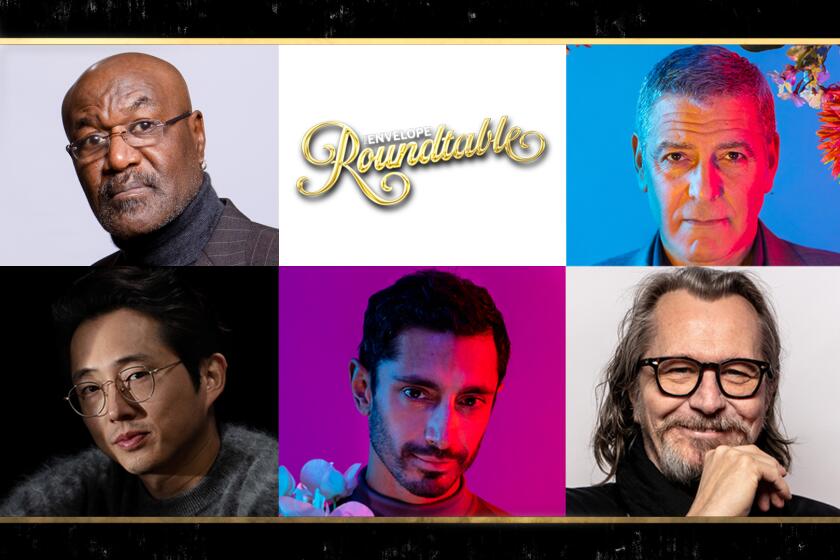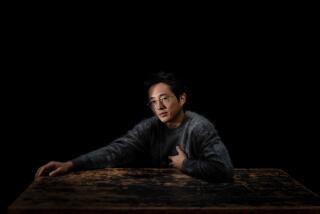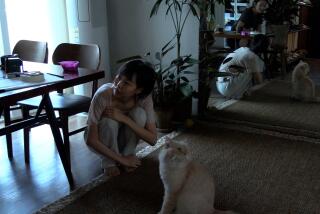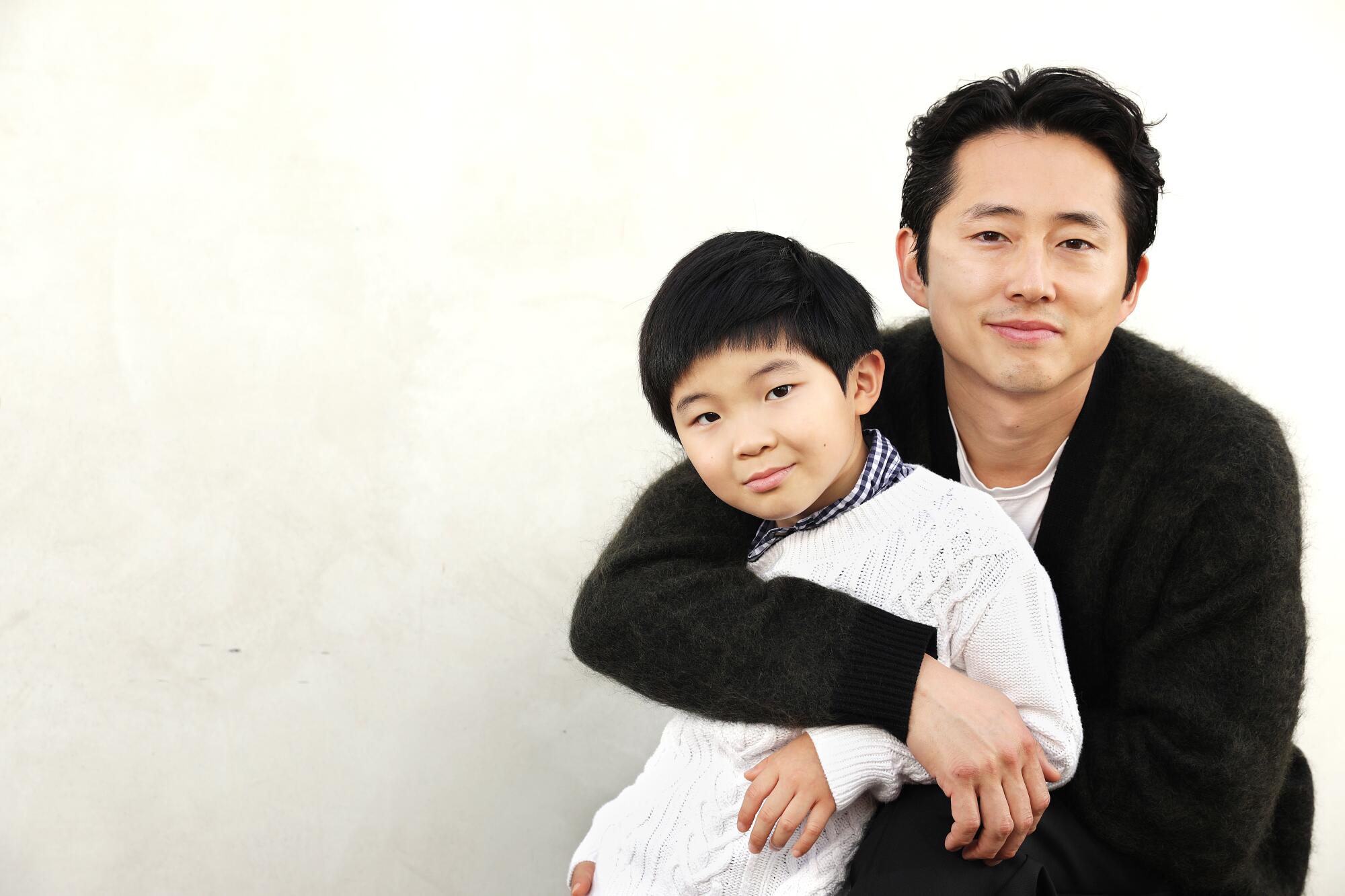
- Share via
Actor Steven Yeun had spent a lifetime working toward the moment when he looked over at his father, seated next to him at the 2020 Sundance Film Festival premiere of “Minari” and saw him crying. Yeun’s father caught him glancing his way and put his hand on his son’s shoulder. Yeun returned the gesture. And then they both began sobbing. Literally. Torrents of tears. No words were exchanged — then or later. There was just this deep feeling of each man feeling finally, properly understood.
That moment didn’t surprise Lee Isaac Chung, the writer and director of “Minari.” When it comes to many Korean American households, he says, there’s not only a cultural gap between immigrant parents and children born in America, there’s also a language barrier that often prevents meaningful communication. That barrier was the starting point for “Minari,” a story, loosely based on his own life, about a Korean American family moving to a farm in the heartland to put down roots and stake a claim for a more meaningful life.
Chung wrote the movie to tell his father that he appreciated his sacrifices. And then he pretty much had the same experience that Yeun had when he unveiled the movie to his family on the Thanksgiving weekend before its Sundance premiere.
“I showed it to them the day after Thanksgiving, which meant that the day before, during Thanksgiving dinner, I was a nervous wreck,” Chung says with a laugh. “When it came time to finally show them, I was thinking, ‘Do I serve wine at this thing? Will wine make them more upset, or will it help ease the mood?’ I was more nervous about this than Sundance, to be completely honest.”
For the record, Chung did serve wine, and at some point he stopped worrying about whether he had honored his parents or portrayed their struggle accurately and just enjoyed the fact that they were together in his South Pasadena home, everyone appreciating that they had endured and were still together.
Riz Ahmed, George Clooney, Delroy Lindo, Gary Oldman and Steven Yeun take us inside their new films and open up about their insecurities.
Chung wrote “Minari” in July 2018 as he was preparing to move to South Korea with his wife and daughter to teach film classes at the University of Utah’s Asia campus. Chung had made four movies, including his 2007 debut feature, “Munyurangabo,” a thoughtful drama set in the aftermath of the Rwandan genocide, shot entirely in Rwanda with local actors. “Munyurangabo” premiered at Cannes, earning a prestigious spot in the festival’s Un Certain Regard section. But a decade later, Chung felt his career was stuck in neutral and began contemplating going into teaching full time.
“Basically, I was the teacher in ‘Soul,’” Chung says, laughing, referring to the latest Pixar Animation feature in which the lead character wrestles with a midlife career commitment.
Before he switched gears, Chung wanted to give filmmaking a last try, putting everything he had into the personal story that became “Minari.” Then he left for Korea and waited. Nothing. He took some students to the Busan film festival and ran into a friend, CAA agent Christina Chou. Chung told her about the script, making sure she knew that “it’s not what you consider a Hollywood movie.” Chou loved it, signed Chung as a client and then, shortly afterward, signed Yeun as well. Coincidentally, the two men are cousins by marriage, though, outside of a couple of family weddings, they’d never met.
If you added up the number of years Chung had been pursuing his dream, it’s 14, which makes Jacob a rather deliberate name for “Minari’s” patriarch.
“Thinking about ‘Minari,’ I was calculating the number of years I’ve been working at this, and then I was thinking about the Old Testament and how Jacob waited seven years to marry his wife, and it turns out he has to wait another seven years, and that’s somehow a tragedy for him,” Chung says. “In terms of my career, I was thinking, ‘When am I going to have that marriage?’ But then I had to think, ‘Wait. I am married, and I have an incredible wife, and that’s what this story is about.’ I needed to reframe the whole paradigm of what Jacob considers to be his salvation or his humanity.”
Chung, 42, pauses. He’s a thoughtful man, witty and incisive, hopeful (within reason) and possessing a refreshing self-awareness that pops out with perfect timing. “I just thought the name ‘Jacob’ fits because me, as an idiot, I just saw myself as Jacob for all the wrong reasons, so I wanted this guy to be Jacob as well.”
Yeun remembers texting Chung, asking if the name was intentional (both men are Christians), and the reply came: “You might have found me out.” Yeun had left “The Walking Dead” in 2015, finding critical acclaim for his work in Lee Chang-dong’s moving, mysterious noir thriller “Burning” in 2018. But too often, the screenplays coming his way focused on Korean American identity juxtaposed to white America.
“Minari” (in theaters and streaming) told the story from the perspective of a specific Korean family: Headstrong Jacob (Yeun), his sometimes impatient wife Monica (Yeri Han), their two children (Noel Cho and Alan S. Kim) and, arriving midway through the film, an irascible grandmother (Yuh-jung Youn).
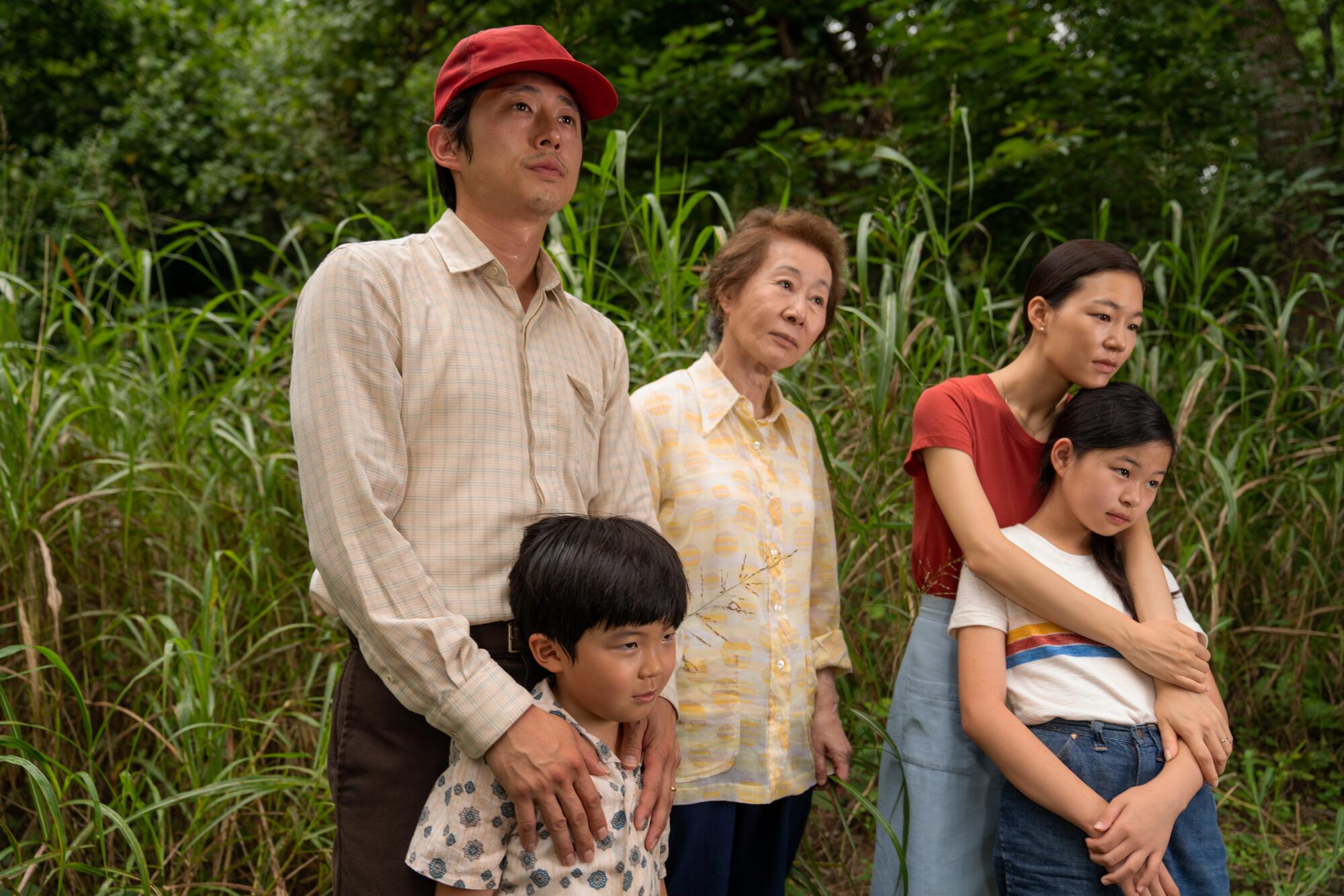
(The cast was nominated in the SAG Awards ensemble category, with Yeun and Youn earning individual honors. Kim, meanwhile, who sat next to Yeun through part of our conversation, has become an adorable breakout story. His favorite part of being in the movie? “Drinking the Mountain Dew!” the 7-year-old answers, referring to his character’s go-to beverage.)
“I don’t think a movie like ‘Minari’ has been made before in this context from this country in this situation, so initially I did feel some pressure to service some larger idea of what a Korean father was, because that archetype looms large,” Yeun says. “It took me a while to come around to just accept Jacob as simply a human being. Looking back on it, I was like, ‘Man, that was harder than it needed to be.’”
“But I realized how few examples we have of that,” Yeun continues. “We’re still navigating a business and a career and an art form that doesn’t really have a lot of Asian Americans in it. That’s changing. But it also leaves us with no real road map. So then every step feels new. Every step feels like frontier. I found pride for that lately. I realized this gamble, even though my parents never wanted me to take it, was an extension of their gamble. In that way, I was like, ‘Oh. I am my father.’”

Which brings us back to that night at Sundance more than a year ago, the tears, the unspoken understanding, feelings they’re still working through.
“I still talk to my dad, and we’re trying to capture it in words, but it’s elusive,” Yeun says. “But then when we just connect to the feeling, it’s like, ‘OK. Fine.’”
More to Read
From the Oscars to the Emmys.
Get the Envelope newsletter for exclusive awards season coverage, behind-the-scenes stories from the Envelope podcast and columnist Glenn Whipp’s must-read analysis.
You may occasionally receive promotional content from the Los Angeles Times.
